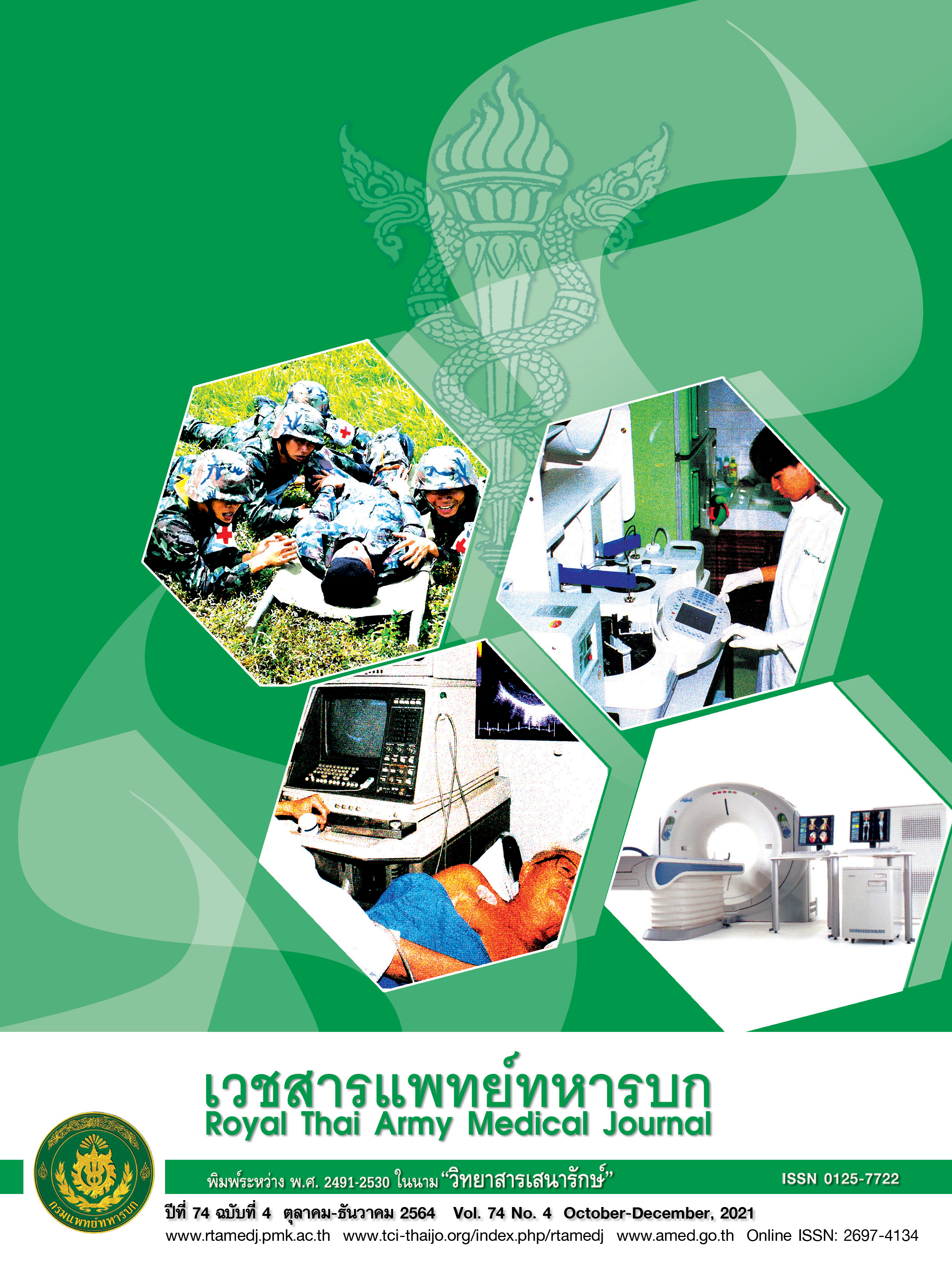ความรู้และพฤติกรรมการใช้ยาปฏิชีวนะของนักศึกษาระดับปริญญาตรีในจังหวัดภูเก็ต
Main Article Content
บทคัดย่อ
การศึกษาเชิงพรรณาครั้งนี้ มีวัตถุประสงค์เพื่อศึกษาระดับความรู้และพฤติกรรมการใช้ยาปฏิชีวนะของนักศึกษาระดับปริญญาตรีในจังหวัดภูเก็ต และศึกษาปัจจัยทำนายพฤติกรรมการใช้ยา กลุ่มตัวอย่างเป็นนักศึกษาระดับปริญญาตรีของมหาวิทยาลัยราชภัฏภูเก็ต มหาวิทยาลัยราชพฤกษ์ ศูนย์การศึกษาภูเก็ต และมหาวิทยาลัยสงขลานครินทร์ วิทยาเขตภูเก็ต จำนวน 400 คน สุ่มกลุ่มตัวอย่างแบบแบ่งชั้นภูมิ เก็บข้อมูลโดยใช้แบบสอบถาม วิเคราะห์ข้อมูลโดยใช้ความถี่ ร้อยละ ค่าเฉลี่ย ส่วนเบี่ยงเบนมาตรฐาน และการถดถอยพหุคูณแบบขั้นตอน ผลการวิเคราะห์ข้อมูล พบว่า กลุ่มตัวอย่างส่วนใหญ่มีความรู้ในการใช้ยาปฏิชีวนะอยู่ในระดับต่ำ คิดเป็นร้อยละ 46.25 และพฤติกรรมการใช้ยาปฏิชีวนะอยู่ในระดับพอใช้ (mean = 2.77, S.D. = 0.97) ส่วนปัจจัยที่สามารถร่วมกันทำนายพฤติกรรมการใช้ยาปฏิชีวนะ ได้แก่ ความรู้ในการใช้ยาปฏิชีวนะ ซึ่งเป็นตัวแปรพยากรณ์ที่สามารถทำนายได้สูงสุด (β = .465, p < .001) รองลงมา คือ รายได้ (β = .130, p < .01) เพศหญิง (β = .126, p < .01) ประสบการณ์การใช้ยาปฏิชีวนะ (β = .115, p < .01) โรคประจำตัว (β = .108, p < .05) และคณะวิทยาศาสตร์และเทคโนโลยี (β = .093, p < .05) ตามลำดับ ตัวแปรดังกล่าวร่วมกันทำนายพฤติกรรมการใช้ยาปฏิชีวนะได้ร้อยละ 31.10 (R2 = .311, p < .001) ผลการวิจัยครั้งนี้นำไปใช้เป็นข้อมูลพื้นฐานในการวางแผนเพื่อพัฒนารูปแบบการส่งเสริมความรู้และพฤติกรรมการใช้ยาปฏิชีวนะที่เหมาะสมในนักศึกษาต่อไป
Downloads
Article Details
บทความในวารสารนี้อยู่ภายใต้ลิขสิทธิ์ของ กรมแพทย์ทหารบก และเผยแพร่ภายใต้สัญญาอนุญาต Creative Commons Attribution-NonCommercial-NoDerivatives 4.0 International (CC BY-NC-ND 4.0)
ท่านสามารถอ่านและใช้งานเพื่อวัตถุประสงค์ทางการศึกษา และทางวิชาการ เช่น การสอน การวิจัย หรือการอ้างอิง โดยต้องให้เครดิตอย่างเหมาะสมแก่ผู้เขียนและวารสาร
ห้ามใช้หรือแก้ไขบทความโดยไม่ได้รับอนุญาต
ข้อความที่ปรากฏในบทความเป็นความคิดเห็นของผู้เขียนเท่านั้น
ผู้เขียนเป็นผู้รับผิดชอบต่อเนื้อหาและความถูกต้องของบทความของตนอย่างเต็มที่
การนำบทความไปเผยแพร่ซ้ำในรูปแบบสาธารณะอื่นใด ต้องได้รับอนุญาตจากวารสาร
เอกสารอ้างอิง
[2] Uddin BM, Yusuf A, Ratan ZA. A review of superbug: A global threat in health care system. Bangladesh J Infect Dis. 2017;4(1):25-8.
[3] Alpert PT. Superbugs: Antibiotic resistance is becoming a major public health concern. Home Health Care Manag Pract. 2016; 29(2):130-3.
[4] O’Neill J. Antimicrobial Resistance: Tackling a crisis for the health and wealth of nations [Internet]. 2014 [cited 2020 December 20]; Available from: https://amr-review.org/sites/default/files/ AMR%20Review%20Paper%20-%20Tackling%20a%20crisis%20for%20the%20health%20and%
20wealth%20of%20 nations_1.pdf.
[5] Centers for disease control and prevention (CDC). Antibiotic/antimicrobial resistance. [Internet]. 2020 [cited 2020 December 20]; Available from: https://www.cdc.gov/drugresistance/.
[6] Phumart P, Phodha T, Thamlikitkul V, Riewpaiboon A, Prakongsai P, Limwattananon S. Health and economic impacts of antimicrobial resistant infections in Thailand: A preliminary study. JHSR. 2012;6(3):352-60.
[7] National antimicrobial resistance surveillance center, Thailand (NARST) [Internet]. Antimicrobial resistance 2000-2019 (6M). 2019 [cited 2020 December 20]; Available from: http://narst. dmsc.moph.go.th/data/AMR%202000-2019-06M.pdf.
[8] Tanthien P. Characteristic of drug use in Thai people. J Hematol Transfus Med. 2009;19(4):309-15.
[9] Food and Drug Administration, Ministry of Public Health, Thailand. Antibiotic smart use guideline. Nonthaburi 2009,1-7.
[10] Nutayakul K, Jivarungruang R. Annual report 2019 (service plan: RDU). Phuket. 2019.
[11] Kinkajorn V, Kanchanavishirakul S. Antibiotics use behavior of patients in health promotion hospital, Regional health promotion center 3. [Internet]. 2011 [cited 2020 December 20]; Available from: http://hpc6.anamai.moph.go.th/images/research/som1.pdf.
[12] Abimbola IO. Knowledge and practices in the use of antibiotics among a group of Nigerian university students. Int J Infect Control. 2013;9(1):1-8.
[13] Angkanavisan K, Peungkiatpairote P, Pangdee N, Thongkumkoon S, Wilaiwongsathien K, Pienklintham P, et al. Knowledge and awareness on rational use of antibiotics among first year students of Mahidol University in the academic year 2011. JHSR. 2012;6(3):374-81.
[14] Papka K, Laohasiriwong W. Situation and factors associate antibiotic used of working aged group in Mahasarakham Province. JBCN_Bangkok. 2018;34(2):13-22.
[15] Yanti N. Factors associated to antibiotic practice among public health students in a University, Phathum Thani. var. 2017;7(2):57-66.
[16] Chaidilok W, Chanthapasa K. The meaning of Ya-Kae-Akseb in Lay’s perspective: A case study of Ban Nakhok, Moo 3, Srisongrak Subdistrict, Muang District, Loei Province. Isan J Pharm Sci. 2014;9(Supplement):93-8.
[17] Mongkolchaipak J, Raumsuk J, Chaiprateep E. The study of customer’s knowledge and behavior in using antibiotics at community drug store in Pathum Thani Province. EAU Heritage J. 2012;6(2):91-100.
[18] Porisutiwutiporn S, Hemchayat M. Influencing factors of antibiotics use behavior of clients in Khlung hospital, Chanthaburi. J Prapokklao Hosp Clin Med Educat Center. 2014;31(2):114-27.
[19] Lambert H, Chen M, Cabral C. Antimicrobial resistance, inflammatory responses: a comparative analysis of pathogenicities, knowledge hybrids and the semantics of antibiotic use. Palgrave Commun. 2019;5(85):1-13.
[20] Jandaeng B, Kosolkittiamporn S, Kenaphoom S. Factors that affecting behavior change. DAJ. 2019;19(4):235-44.
[21] Aunruean W, Saensom D. Behavior of KKU students on antibiotics use in sore throat, clean wound and acute diarrhea. KKU isr j. 2015;3(3):221-32.
[22] Phomma A, Netchang S, Kaewkong N, Mapiw P, Naktang N. Factors influencing antibiotics use of nursing students to sore throat, clean wound and diarrhea. BCNUT J Nurs. 2020;12(1):165-79.
[23] Li J, Xie S, Ahmed S, Wang F, Gu Y, Zhang C, et al. Antimicrobial activity and resistance: influencing factors. Front Pharmacol. 2017;8(364):1-11.
[24] Krzych LJ, Czok M, Putowski Z. Is antimicrobial treatment effective during therapeutic plasma exchange? Investigating the role of possible interactions. Pharmaceutics. 2020;12(395):1-16.
[25] Sornkrasetrin A, Thongma N, Rajataramya B. Factors predicting the rational antibiotic use among nursing students. JBCNM. 2019;25(1):43-59.
[26] Bunmusik S, Chantra R, Heeaksorn C. Knowledge attitude and behaviors in rational antibiotics use of nursing students Southern college of nursing and public health network. JHRI. 2019;2(1):25-36.
[27] Sukpaiboon S, Apinandecha C, Chaisiri K. Antibiotics use behavior of patients in Srangsoke, Ban Mo District. Saraburi Province. Proceeding of the national conference & research presentation 2016: Toward The second decade: sustainability knowledgement on research integration; 2016 Jun 17; Nakhon Ratchasima, 409-16.
[28] Orem DE, Taylor SG, Renpenning KM. Nursing: concepts of practice. 6th ed. St. Louis: Mosby;2001.
[29] Sakcharoen P. Adult learning theory and self-directed learning concept: learning process for promoting lifelong learning. JRTAN. 2015;16(1):8-13.
[30] Numdee W. Behavior in using antibiotics of village health volunteers Doembangnangbuat District Suphanburi Province. JMND. 2020;7(7):213-28.


